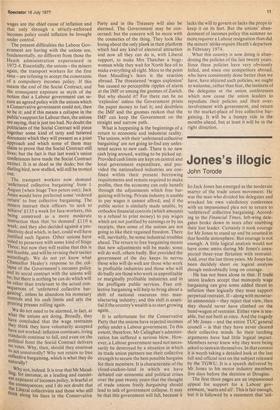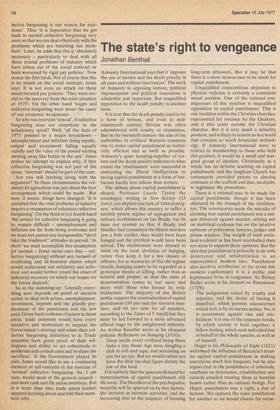Jones's illogic
John Torode
So Jack Jones has emerged as the moderate martyr of the trade union movement. He was the man who divided his delegates and wrecked his own valedictory conference with an impassioned plea not to return to 'unfettered' collective bargaining. According to the Financial Times, left-wing delegates broke down in tears after snubbing their lost leader. Certainly it took courage for Mr Jones to stand up and be counted in that hostile atmosphere. But courage is not enough. A little logical analysis would not have come amiss during Mr Jones's unexpected three-year flirtation with restraint. And, over the last three years. Mr Jones has been decidely short on logical analysis though undoubtedly long on courage.
. He has not been alone in that. If trade, union leaders accept that monopoly wage bargaining can give some added thrust to inflation then logically they must support perpetual restraint. If — along with monetarist economists — they reject that view, then they should never have climbed on the band-wagon of restraint. Either view is tenable, but not both at once. And the tragedy of Mr Jones — and the entire TUC general council — is that they have never cleared their collective minds. So their lurching arguments have had little logical impact. Members never knew why they were being asked to restrain themselves. In that context it is worth taking .a detailed look at the last full and official text on the subject released by the TGWU. It is a speech delivered by Mr Jones to his motor industry members five days before the decision at Douglas.
The first three pages are an impassioned appeal for support for a Labour government, `warts and all'. This is fair enough, but it is followed by a statement that 'col lective bargaining is our reason for existence'. Thus 'it is imperative that we get back to normal collective bargaining very soon so that we can deal effectively with the problems which are besetting our members'. Later, he adds that this is `absolutely necessary — particularly to deal with all those crucial problems of industry which have arisen out of the social contract or been worsened by rigid pay policies'. Now comes the first lurch. Not of course that this is an attack on the social contract, Jones says. It is not even an attack on these much-berated pay policies. 'They were crucial to the recovery from the crisis situation of 1975'. On the other hand 'wages and collective bargaining were never the cause of our economic weaknesses . . . '
So why was restraint 'crucial', if collective bargaining does not contribute to the inflationary spiral? Well, 'all the facts of 1975 pointed to a major breakdown — unemployment and inflation rising rapidly, output and investment falling equally rapidly and the value of the pound sterling melting away like butter in the sun'. Jones makes no attempt to explain why, if free collective bargaining was not part of the cause, `restraint' should be part of the cure.
Are you still lurching along with the argument? 'In these circumstances the voluntary £6 agreement was just about the best arrangement which could be made'. But now, it seems, things have changed: 'It is accepted that the vital problems of industry require a resumption of voluntary collective bargaining'. On the third or is it fourth hand 'the context for collective bargaining is going to remain difficult — unemployment and inflation are far from being overcome and we must not permit any irresponsible "devil take the hindmost" attitudes to prevail.' In short 'we must accomplish this resumption lof normal — Jones never says free — collective bargaining] without any turmoil of conflicting and ill-founded claims which would undermine our solidarity and influence and would further retard the onset of industrial recovery on which our hopes for the future depend.'
So to the summing-up: `Literally everything now depends on proof of decisive action to deal with prices, unemployment, inveitment, imports and the ghastly predicament of the pensioners and the low paid, Given hard evidence of action in those areas, trade unionists would have every incentive and motivation to support the Government's strategy and relate their collective bargaining initiatives to it. Trade unionists have given proof of their willingness and ability to act collectively to moderate and control costs and to share the sacrifices'. If the Government played its part, Jones would like to see i continuing element of self-restraint in the exercise of `normal' collective bargaining. So, I am sure, would most of the general council — and most rank and file union members. But it is more than time trade union leaders stopped lurching about and told their members why.



































 Previous page
Previous page